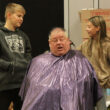Sean C. Morgan
A proposed city ordinance that would allow the use of certain all-terrain vehicles on city streets was back on the table last week as Sweet Home Police Chief Jeff Lynn told the City Council that a similar ordinance in Oakridge has not really increased call levels there.
The ATV ordinance was one of several proposals councilors discussed at their regular meeting, on Aug. 27.
The council has been occasionally discussing an ordinance for the past year to allow the use of class IV all-terrain vehicles, side-by-side vehicles, on city streets; and during the Aug. 27 meeting, Lynn reported what he has learned about a similar ordinance to one Oakridge passed in February 2018. The Oakridge law allows use of all ATVs on city streets.
The reason for the Oakridge ordinance was to connect the city to public lands where their use is allowed, Lynn said.
The council began discussing the Sweet Home proposal after a citizen approached former Councilor Bob Briana about allowing side-by-sides on city streets.
Other cities have been allowing them, City Manager Ray Towry told the council last year. He noted that they were legal on city streets in Ephrata, Wash., where he last worked, and the city had no problems with them.
“The ordinance is fairly straightforward,” Lynn said, and state law spells out the requirements, including age restrictions and licensing.
Violations would go to Municipal Court and could be cited as a violation of a state law or a city ordinance depending on which regulation is violated, according to Lynn and City Attorney Robert Snyder.
It would not allow the vehicles to be operated in city parks, Lynn said.
Lynn told the council he would need to look at whether gasoline-powered golf carts might be considered class IV ATVs.
“My biggest concern is enforcement and the consequences of being stupid,” said Councilor Dave Trask. “You know there’s going to be some knucklehead.”
Police deal with that with automobile drivers as well, Lynn said, and they’ll deal with ATV drivers.
Ephrata officials had the same concerns, Towry told the council last week.
“It was a novelty for a bit, but some people did utilize them (daily) weather permitting.”
It gave people another option for transportation, Towry said. They had to be licensed and equipped with signals and lighting.
“It comes down to having the appropriate equipment,” Towry said.
Mayor Greg Mahler worried about people stretching the boundaries on the highways, but he said he didn’t have a problem with the ordinance.
Under the proposed ordinance and state law, a class IV ATV is any motorized vehicle that travels on four or more pneumatic tires that are 6 inches or more in width and that are designed for use on wheels with a rim diameter of 14 inches or less; is designed for or capable of cross-country travel on or immediately over land, water, sand, snow, ice, marsh, swampland or other natural terrain; has nonstraddle seating; has a steering wheel for steering controls; has a dry weight of 1,800 pounds or less; and is 65 inches wide or less at its widest point.
The ordinance would permit the operation of the ATVs on city streets while prohibiting them on Highway 228 and Highway 20. They would be allowed to cross those highways. Drivers must be at least 16 years old and hold a valid driver’s license with a valid class IV ATV operator permit. Persons younger than 18 would need to wear a helmet with a chin strap, and seatbelts would be required. The vehicle must carry liability insurance.
The council will decide in a future meeting whether to move forward with the ordinance. The ordinance must be read in its entirety once and by title twice more in three meetings before the council may decide whether to approve the ordinance.
Present at the meeting were councilors Cortney Nash, Susan Coleman, Lisa Gourley, Mahler, Diane Gerson and Dave Trask. James Goble was absent.
During the meeting, city staff introduced four additional ordinance proposals and examples from other cities regarding public peace, safety, health, property and welfare.
Towry told the council that he would return to council with the ordinances after councilors have had a couple of weeks, until the council’s regular meeting on Sept. 10, to think about them and then decide whether to move forward with them.
– First among them was a discussion about noise. Snyder said the topic has come up recently regarding home occupations and outdoor music at local bars.
The biggest noise issue in Sweet Home is the Oregon Jamboree itself, Mahler said.
And sometimes the bars, Snyder added, but when police go by and tell them to turn down the music, and the bars will comply.
Lynn said that police have responded to 19 noise complaints at one of the bars in the past 18 years and nine times to another in the past five years. In five years, Sweet Home police have issued a total of five citations based on noise complaints.
“We gain quite a bit of compliance,” Lynn said. Police respond to more than two noise complaints each week.
The city’s noise ordinance limits noise by type, based on time and distance, with the police chief and council capable of issuing sound permits for music.
Other city ordinances address dogs barking, and the human voice is not included in the noise ordinance.
“If our ordinance is missing anything, it’s the human voice,” Lynn said.
At this point, loud human voice may be considered disorderly conduct, a misdemeanor.
Towry told the council that an issue with a specific garage in a residential area, which helped lead to the discussion about the ordinance, has been addressed through code enforcement.
Towry told The New Era that staff will return to the council with a provision to include the human voice, allowing officers to cite people for violations instead of going all the way to a misdemeanor to address noise complaints about human voices.
– The second ordinance was a proposal to prohibit transfer of money or other items from a vehicle to a person outside the vehicle in a roadway.
Other cities have been passing similar ordinances as a way to address homelessness and panhandling, Towry told The New Era. City staff members have had requests to address homelessness, and this was something other cities have been doing.
He said he didn’t think that panhandling with vehicles has been a problem in Sweet Home.
Snyder told the council that courts have ruled that panhandling is free speech, protected by the Constitution.
An ordinance like this protects the safety of the driver and pedestrian and puts the onus on a driver handing things through a window, he said.
“It is a potentially dangerous exchange with the possibility of someone being seriously injured since there is a running and/or moving vehicle involved. Further, a distracted driver is never safe whether from his or her own actions of the transfer or another person in the vehicle doing the same thing and the driver having to contend with that transfer.”
Gourley said that in Lebanon, she often sees firefighters collecting money into boots from motorists.
For things like that, Towry said, the city could allow a special permit, and some cities specifically exempt “fill the boot” events.
– Third is a proposal to prohibit urinating or defecating in a public place except in restrooms.
The state Supreme Court recently ruled that if an ordinance doesn’t specifically prohibit urination and defecation in public places, then it’s not illegal, Snyder said. Littering no longer covers it.
Cities had been using charges of offensive littering or placing an offensive substance on a public right-of-way, which is typically the charge that Sweet Home officers have used to cite people for urinating or defecating in public.
On private property, it can be addressed as criminal mischief or criminal trespass, Snyder said.
Gourley noted that many people have crossed social norms, and for them, “what’s one more fine?”
She said it’s important that they have restrooms available to use.
– Fourth was an ordinance to form an “enhanced law enforcement exclusion area.”
Under the proposal, repeat offenders could be excluded from the area, making it a criminal trespass to be in the area.
The ordinance is patterned after several other city ordinances and the city’s own chronic nuisance ordinance governing properties with repeat criminal offenses associated with them. Under that ordinance, the city can temporarily complete revoke the use of a private property.
Police believe that the ordinance would help prevent repeat offenders from committing additional violations and crimes in the exclusion area, which would cover the downtown area, from 4th Avenue to 22nd Avenue along Main Street and portions of Nandina and Long streets.
A person could be excluded for a period of 30 days if the person is cited to appear or arrested within the area a total of three or more times during the previous five years. If the person has been excluded from the area before, the next exclusion period would be for 90 days.
It would include a variety of exemptions, such as visiting the residence of a family member, school, work, drug treatment, consulting with an attorney, attending or visiting a church, attending a public meeting, attending court, social services, medical services or to exercise a constitutional right. The ordinance also exempts excluded persons traveling in a vehicle.
“It’s just really food for thought for the council at this time,” Lynn said.
In other business on Aug. 27, the council:
– Approved a supplemental budget setting aside up to $54,000 for a sign at the new City Hall and new furniture for the lobby, conference rooms and other areas.
After completion of the new City Hall, which thus far has cost a total of nearly $2 million, the city’s Building Reserve Fund had $39,000 remaining with an additional $15,000 accrued in interest, said Finance Director Brandon Neish.
The funds were part of the project in 2018-19, which ended June 30, Towry said. City officials had not anticipated waiting 90 days for Internet installation, and the project carried into the next fiscal year with no funds budgeted.
– Appointed Brittany Donnell to the Library Board.
– Appointed James Curtis to the Park and Tree Commission.
– Recommended to the Ore-gon Liquor Control Commission approval of a liquor license for Sudip Lamichhan and Foster Lake Market, based on a change in ownership.
– Approved an intergovernmental agreement with Linn County to continue operating juvenile Peer Court.
– Approved a supplemental budget to transfer an additional $19,000 from the city’s Project and Equipment Reserve Fund to pay for a new pickup for use by the code enforcement officer. The total request is for $30,000 based on the purchase of a Chevrolet Silverado for $26,000 last year. Money would be refunded to the Project and Equipment Reserve Fund by the Community and Economic Development Department in coming budget years.
The code enforcement officer had been using a 2008 Mercury Mariner purchased in 2015 for $9,000, Neish said. The vehicle had 124,000 miles at purchase and today has more than 146,000 miles.
The city mechanic informed city staff the vehicle needs a replacement transmission, which would cost approximately $4,500, Neish said. The vehicle, in fair condition, is worth $3,000 and in excellent condition is worth nearly $4,000, so the cost of repairing the vehicle exceeds its resale value.




